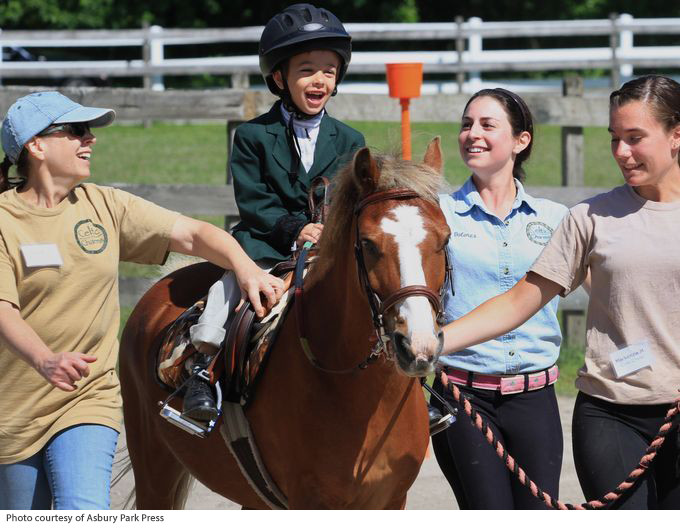THERAPY HORSE FARM WORKS LIKE A CHARM TO HELP DISABLED CHILDREN
December 19, 2017
Sean's story
As a very young boy, Sean (not his real name), who is on the Autism spectrum, loved riding the horses at Celtic Charms Therapeutic Horsemanship. As he learned to ride, he noticeably improved in balance, posture, and control of the horse. “He would get that horse to dance,” says program director Christine Landuyt.
He favored one horse in particular, and his parents sponsored it each year. One day he and his mother arrived early and observed the horse getting tacked up. It was the first time Sean had seen the bridle being put on – and he was shocked to see the bit go into the horse's mouth. “He didn't want to hold the reins that day,” says Landuyt. “He didn't want to hurt the horse.”
...and then there was connection!
Then there was a surprise. Sean's mother later said, with happy tears, it was the first time her little son had ever shown compassion – for anything. “The experience really made a connection for him,” says Landuyt.
She believes people, especially children, can learn compassion through connecting to an animal. There are additional connections for children with disabilities. For example, a child who learns how to hold a rein is suddenly is able to pick up a crayon because of the similar mechanics. “What we do here is not just horseback riding – it's about all these wonderful connections,” she says.
History
Celtic Charms started 8 years ago with a run-down piece of property, a lot of elbow grease, and a love of horses. Landuyt, who grew up on a farm in Zimbabwe that had horses, and calls them a “magical part” of her childhood.
As an adult, she discovered when she did volunteer work with children that she has a special love for children with disabilities. It became her goal to have a horse farm that provided therapeutic horsemanship so she could help those children.
Benefits of therapeutic horsemanship
The goal of this program is to use therapeutic horsemanship or equine-assisted activities and therapies to not only strengthen children physically, but provide benefits they can transfer to other areas of their lives. A list of disabilities that can be helped from therapeutic horsemanship include:
- ADD/ADHD
- Amputation
- Autism spectrum disorder
- Cerebral palsy
- Depression
- Developmental delay
- Down Syndrome
- Head trauma/brain injury
- Hearing impairment
- Learning disability
- Multiple sclerosis
- Muscular dystrophy
- Speech impairment
- Visual impairment
A good cause to support
Celtic Charms is unusual in that every penny collected from fundraisers (e.g. ride-a-thons) goes into the program. While they have certified instructors who are salaried, they use separate funding for that. Neither Landuyt nor her husband, executive director William Landuyt, draw a salary.
“It's this dedication and purposefulness that make Celtic Charms a pleasure to support,” says Jim Henkel, general manager of A.J. Perri. “We want to help others and give wisely. This is the kind of organization that makes our community a better place.”
To help or learn more, visit the Celtic Charms Therapeutic Horsemanship website.

